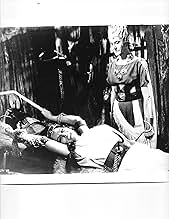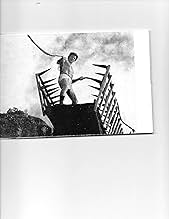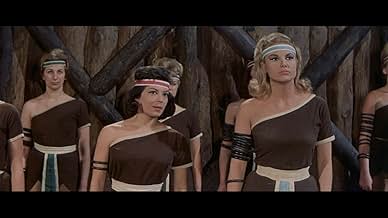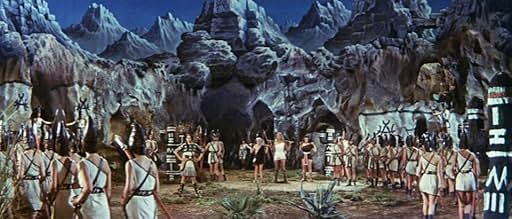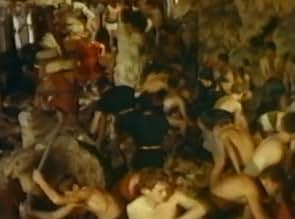A race of Amazon warriors is enslaving the men of a country, and the mighty Thor is called upon to help them regain their freedom.A race of Amazon warriors is enslaving the men of a country, and the mighty Thor is called upon to help them regain their freedom.A race of Amazon warriors is enslaving the men of a country, and the mighty Thor is called upon to help them regain their freedom.
Storyline
Did you know
- TriviaFilmed back-to-back with Taur, il re della forza bruta (1963)
- ConnectionsFeatured in Kolossal - i magnifici Macisti (1977)
Featured review
"Thor and the Amazon Women" exemplifies the kind of moronic muscle man movie that gives peplum a bad name. In this poorly scripted and staged potboiler set in ancient times, a matriarchal society enslaves helpless males to toil in its salt mines and imprisons captive females to train as gladiators. Enrolled in a gladiator school, these gals must wear twenty-one rings on one arm. The rings account for the number of battles that each must fight to acquire their freedom. Anyway, when Queen Nera's (Diana Ross look-a-like Jannin Hendy of "Mole Men Vs. the Son of Hercules") beautiful blond Barbie doll-type soothsayer who wanders around a grotto prophesies that a strongman will dismantle her distaff empire with his bare hands, the Queen proclaims that anybody who can identify such a dude will receive a reward of a hundred male slaves if she can reveal his whereabouts. Nera dispatches an expedition to find a man called Thor and bring him back alive. They march into Thor's homeland and try to catch him with a set of bolas, an array of ropes attached to spiked balls whose thorny points have been dipped in a drug designed to incapacitate its victim. They hurl this weapon at Thor as he backs away from them. You see, Thor refuses to fight women. Entwining his ankles, the bolas topple our brawny protagonist so that he falls backwards off a cliff and lands atop of his servant, Ubaratutu (African-American beef-cake specimen Harry Baird of "Tarzan the Magnificent"), who hides him from the Amazons. These nubile chicks wear headdresses that resemble something a smurf would sport. Since they cannot take Thor back to Nera, the Amazon women abduct a princess-in-exile, Tamar (shapely blond beauty Susy Andersen of "Black Sabbath") and her younger brother. Tamar and her brother Homolke—it seems—belonged to the royal patriarchal family that once ruled the kingdom over which Nera presides. Marauders attacked Tamar's village, burned their houses, and dragged their dad behind their horses until he died. They escaped with their lives and have lived in exile ever since. Okay, Thor recuperates in a cave under the watchful eye of Ubaratutu. The fall from the mountain disjointed Thor's shoulder, so Ubaratutu refuses to let him track down Tamar's abductors until he is well enough to travel.
Clocking in at 85 minutes, this lackluster,battle of the sexes saga spends more time on the Amazon women than our mesomorphic hero. In fact, Thor doesn't reach the Amazon camp until about 49 minutes have elapsed, and he botches his initial act of heroism to save a man from execution. If you rank your muscle man movies by the feats that the hero performs to vanquish his opponents, nothing here appears remotely impressive. Meanwhile, simple-minded Ubaratutu follows Thor into the land of Amazon women, but this comic black sidekick wants nothing to do with Thor's shenanigans. While Thor is trying to figure out what is going on in this Amazon camp where the men have no desire to revolt because they are inadequately fed, Ubaratutu becomes the apple of Queen Nera's eye. She ogles him like a voyeur from a secret room and asks him to assume a variety of poses as he stands on a lazy Susan platform to show off his strength. Eventually, Nera crowns Ubaratutu as her king, that is, until she grows tired of him.
The irony about the politically incorrect "Thor and the Amazon Women" is that in the land of the white man, Ubaratutu is a slave, while in the land of the Amazon women (most are Caucasian), the queen is black. Furthermore, Queen Nera totes around a white cat as a symbol of her authority. Eventually, they capture Thor and bring him before her. Our eponymous hero and she engage in a philosophical argument that constitutes the high point of the film. Quoting Nera, she proclaims: "But we after a long period of slavery under the rule of men realized that women were superior to men. They (women) procreate children, they are internally stronger than men, they know how to resist physical and moral pain." Not surprisingly, Thor calls her "cruel." She maintains power over the men sweating for her in the mines, because they have lost their rebellious spirit. Before this confrontation, Tamar converses with Yamad (Maria Fiore of "Rambo's Revenge"), Queen Nera's Captain-General of the Army. The captain-general has grown disillusioned with their matriarchal society and secretly serves as the architect of a conspiracy to overthrow Nera. Quoting her, Yamad says to Tamar: "The rule of women was the most frightful and horrible form of government." Yamad adds, "A woman cannot deprive herself of every human sentiment in the name of the superiority that nature never meant to assign to them." This is about as good as the dialogue gets that scenarists Fabio Piccione of "The Glass Sphinx," Maria Sofia Scandurra and director Antonio Leonviola contrived for this half-baked hokum.
In the last ten minutes, Thor is put atop a platform and forced to compete in a massive tug of war match with 101 female warriors. If he loses, he will plunge from the platform into a blazing fire, while at the same time the princess Tamar must battle an unscrupulous brunette to the death in a triangular-shaped area with spikes on the edges. British actor Joe Robinson isn't given nearly enough either to do or say in this anti-feminist 85 minute yawner. Robinson later appeared as a villain in the 007 movie "Diamonds Are Forever" and slugged it out with Sean Connery in the claustropobhic confines of an elevator. Actually, the women do a lot more fighting than Thor, and his victory over them in the tug of war is nothing memorable. Of course, in an era that probably didn't have cosmetics and apparel as depicted here, the women are all gorgeous and perfectly made up with red lipstick and blue eye-shadow.
Clocking in at 85 minutes, this lackluster,battle of the sexes saga spends more time on the Amazon women than our mesomorphic hero. In fact, Thor doesn't reach the Amazon camp until about 49 minutes have elapsed, and he botches his initial act of heroism to save a man from execution. If you rank your muscle man movies by the feats that the hero performs to vanquish his opponents, nothing here appears remotely impressive. Meanwhile, simple-minded Ubaratutu follows Thor into the land of Amazon women, but this comic black sidekick wants nothing to do with Thor's shenanigans. While Thor is trying to figure out what is going on in this Amazon camp where the men have no desire to revolt because they are inadequately fed, Ubaratutu becomes the apple of Queen Nera's eye. She ogles him like a voyeur from a secret room and asks him to assume a variety of poses as he stands on a lazy Susan platform to show off his strength. Eventually, Nera crowns Ubaratutu as her king, that is, until she grows tired of him.
The irony about the politically incorrect "Thor and the Amazon Women" is that in the land of the white man, Ubaratutu is a slave, while in the land of the Amazon women (most are Caucasian), the queen is black. Furthermore, Queen Nera totes around a white cat as a symbol of her authority. Eventually, they capture Thor and bring him before her. Our eponymous hero and she engage in a philosophical argument that constitutes the high point of the film. Quoting Nera, she proclaims: "But we after a long period of slavery under the rule of men realized that women were superior to men. They (women) procreate children, they are internally stronger than men, they know how to resist physical and moral pain." Not surprisingly, Thor calls her "cruel." She maintains power over the men sweating for her in the mines, because they have lost their rebellious spirit. Before this confrontation, Tamar converses with Yamad (Maria Fiore of "Rambo's Revenge"), Queen Nera's Captain-General of the Army. The captain-general has grown disillusioned with their matriarchal society and secretly serves as the architect of a conspiracy to overthrow Nera. Quoting her, Yamad says to Tamar: "The rule of women was the most frightful and horrible form of government." Yamad adds, "A woman cannot deprive herself of every human sentiment in the name of the superiority that nature never meant to assign to them." This is about as good as the dialogue gets that scenarists Fabio Piccione of "The Glass Sphinx," Maria Sofia Scandurra and director Antonio Leonviola contrived for this half-baked hokum.
In the last ten minutes, Thor is put atop a platform and forced to compete in a massive tug of war match with 101 female warriors. If he loses, he will plunge from the platform into a blazing fire, while at the same time the princess Tamar must battle an unscrupulous brunette to the death in a triangular-shaped area with spikes on the edges. British actor Joe Robinson isn't given nearly enough either to do or say in this anti-feminist 85 minute yawner. Robinson later appeared as a villain in the 007 movie "Diamonds Are Forever" and slugged it out with Sean Connery in the claustropobhic confines of an elevator. Actually, the women do a lot more fighting than Thor, and his victory over them in the tug of war is nothing memorable. Of course, in an era that probably didn't have cosmetics and apparel as depicted here, the women are all gorgeous and perfectly made up with red lipstick and blue eye-shadow.
Details
- Runtime1 hour 24 minutes
- Sound mix
- Aspect ratio
- 2.35 : 1
Contribute to this page
Suggest an edit or add missing content

Top Gap
By what name was Thor and the Amazon Women (1963) officially released in Canada in English?
Answer

